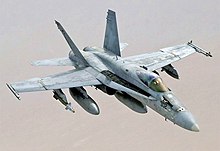Draft:Tic Tac (UFO)
The Tic Tac was an unidentified flying object (UFO) reported by United States Navy fighter pilots David Fravor, Alex Dietrich, and witnessed by two weapons systems officers in November of 2004. A visual recording of the object was captured using Forward-looking infrared (FLIR) targeting cameras and was officially released by the Department of Defense in 2020 as part of the four declassified Pentagon UFO videos, after footage of the aircraft titled "FLIR" was initially published by The New York Times and received extensive media coverage in December 2017.[1] The object was subsequently coined the "Tic Tac" by a second wave of fighters, later explained to be partially inspired by a joke in the 1980 comedy Airplane! [2]
An Executive Report by the Department of Defense claimed that the "Anomalous Aerial Vehicle" (AAV) could not be identified as an aircraft of United States inventory or of any foreign nation.[3] Widespread speculation has attributed to a number of theories, including skeptical claims that the object is of unidentified foreign technology (e.g., drone), instrument or software malfunction, a common aircraft (e.g., a passenger airliner) or aerial device, and claims that the object is of extraterrestrial origin.[4][5]
Background
The USS Nimitz (CVN-68) is a nuclear powered aircraft carrier of the U.S. Navy that has been in service since the 1975 as part of a fleet-wide realignment that year. By 2003, Nimitz was deployed to the Persian Gulf in mid-April to launch Carrier Air Wing 11 aircraft sorties over Iraq in support of Operation Iraqi Freedom (OIF) and Afghanistan in support of Operation Enduring Freedom (OEF). Nimitz returned to San Diego, California on 5 November 2003.[6][7] During the months of November and December of 2004, the USS Nimitz's Carrier Strike Group (CSG) underwent deployment preparations the SOCAL Operating Area off the coast of California and Mexico.[8] The CSG comprised of the USS Nimitz, USS Princeton (CG-59), USS Chafee (DDG-90), USS Higgins (DDG-76), and the USS Louisville (SSN-724) submarine.[8] The USS Princeton and USS Nimitz were the only two warships present during the encounter.[8]
The USS Princeton, a Ticonderoga-class guided-missile cruiser and among the only participants in the event, had been performing routine training in the Pacific Ocean at the time of detection.[9] The Princeton was the first Ticonderoga-class cruiser to carry the upgraded form of the AN/SPY-1B radar system and was equipped for surface-to-air, surface-to-surface, anti-submarine warfare[10], had been carrying two Seahawk LAMPS III helicopters at the time of training.[10] The Naval Base San Diego was the homeport of the Princeton where it was overhauled in San Diego in 2003 assigned to Carrier Strike Group Three.
The AN/SPY-1 3D radar system and -1B upgrade is installed on the Princeton and was under active use at the time of the event.[11] According to the Department of Defense, the multifunction phased-array radar used by the Princeton had already detected several AAVs during their Tailored Ships Training Availability (TSTA) in preparation for their deployment to the Arabian Sea.[9] These detections had occurred during their time period of roughly 10-16 November 2004 of operating with the Nimitz Carrier Battle Group.[10]
The 4 MW radar was capable of tracing over 100 targets and perform search, track and missile guidance functions simultaneously. However, the object was reported to exhibited "advanced low observable characteristics at multiple radar bands and render US radar based engagement capabilities ineffective".[11] Further observations indicated the the AAV could demonstrate a highly advanced capability to operate undersea, and therefore become undetectable by advanced sensors.[12]
Sighting
Aftermath
Release
See also
References
Citations
- ^ George 2021, p. 1
- ^ Bender 2017, pp. 1–4
- ^ Knapp 2024, pp. 1–2
- ^ O'Donnell 2021, pp. 1–5
- ^ Gault 2020, pp. 1–4
- ^ Arendes 2004, pp. 1–5
- ^ David 2021, pp. 1–3
- ^ a b c Tic Tac UFO Executive Report, p. 2"Nimitz Carrier Strike Group (CSG-11)"
- ^ a b Cooper, Helene; Kean, Leslie; Blumenthal, Ralph 2017, p. 1
- ^ a b c Tic Tac UFO Executive Report, p. 3"USS Princeton (CG-59)"
- ^ a b Tic Tac UFO Executive Report, p. 4"AN/SPY-1"
- ^ Tic Tac UFO Executive Report, p. 1"Key Assesments"
Works cited
- Moreno, Miguel A. (2023-05-24). Understanding Uaps/Ufos: Implications for National Security and Air Safety. iUniverse. pp. 26–72. ISBN 978-1663245724.
{{cite book}}: CS1 maint: date and year (link) - George, Pavithra (2021-06-25). "Normalizing' UFOs - retired U.S. Navy pilot recalls Tic Tac encounter". Reuters. pp. 1–4. Retrieved 2024-12-18.
- Knapp, George (2024-11-12). "The 'tic tac' incident: Inside one of the most consequential UFO encounters of all time". NewsNation. pp. 1–19. Retrieved 2024-12-18.
- Bender, Bryan (16 December 2017). "The Pentagon's Secret Search for UFOs". Politico. Archived from the original on 16 December 2017. Retrieved 2024-12-18.
- "USS Nimitz 'Tic Tac' UFO: Declassified Video". History Channel. Retrieved December 18, 2024.
- David, Leonard (2021-06-28). "Up in the air! US government's UFO report stirs range of reactions". Space.com.
- Arendes, Ahron (3 June 2004). "Nimitz, CVW-11 Win 2003 Flatley Award" (Press release). North Island, California: USS Nimitz Public Affairs. Navy News Service. Archived from the original on 12 September 2007. Retrieved 30 May 2010.
- Cooper, Helene; Kean, Leslie; Blumenthal, Ralph (2017-12-16). "2 Navy Airmen and an Object That 'Accelerated Like Nothing I've Ever Seen". New York Times.
{{cite news}}: CS1 maint: multiple names: authors list (link) - O'Donnell, Wes (2021-09-09). "Sorry, But It's Probably Not Aliens – So What Are Navy Pilots Seeing in the Skies?". American Military University. pp. 1–6. Retrieved 2024-12-19.
- Gault, Matthew (2020-05-06). "The Skeptic's Guide to the Pentagon's UFO Videos". Vice. pp. 1–7. Retrieved 2024-12-19.
External links
- TIC-TAC-UFO-EXECUTIVE-REPORT pp. 1-13


